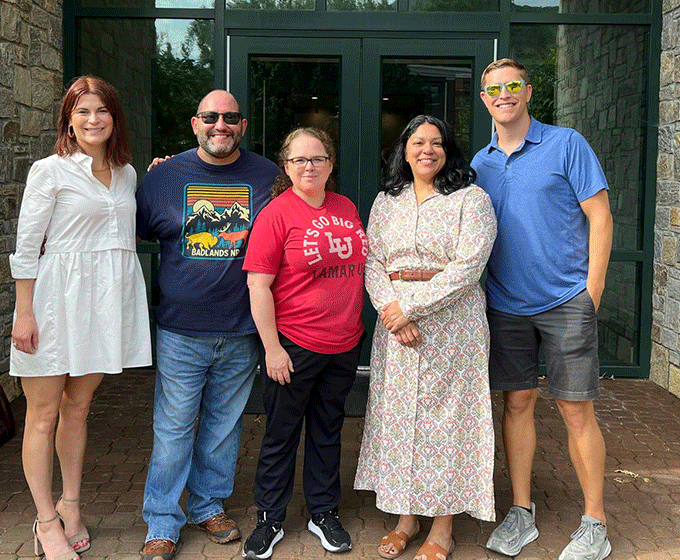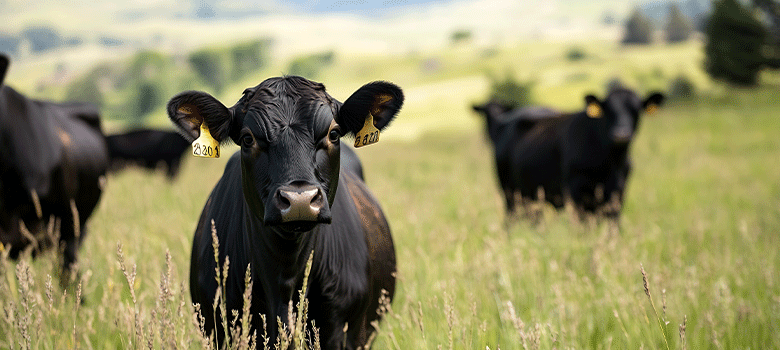
Left to right: Cecilia Orphan, co-director; Andrew Koricich, executive director; Alisa Hicklin Fryar, co-director; Vanessa A. Sansone, co-director; and Kevin R. McClure, co-director.
APRIL 17, 2025 — A UTSA researcher will support a newly funded inter-institutional collaboration that aims to provide highly tailored professional training and workforce development to rural communities across five states. With $7,245,600 in funding from Ascendium Education Group over a four-year period, Appalachian State University’s Alliance for Research on Regional Colleges (ARRC) will lead the helm to establish a Rural Talent Lab that addresses gaps in the workforce and collaborates with rural-serving institutions (RSIs) to deliver in-demand educational programs.
Through the project, the researchers will implement at least four credential pathways per location, for example, associate’s degrees and sub-baccalaureate certificates, in areas that directly address the rural workforce and economic needs of each state. The alliance will aim to keep these learning opportunities free or low-cost.
The team will work closely with rural communities to identify occupations and industries that are primed for growth in their region and require fewer than four years of training. To gather this input, the team will conduct an extensive listening tour — a series of focus groups to gather feedback from key stakeholders in rural communities.

The AARC will work closely with rural communities to identify industries that are expected to grow.
Vanessa A. Sansone, UTSA associate professor of educational leadership and policy studies and co-director of ARRC, will assist the community listening tour. She will design and conduct surveys, attend focus groups and analyze the feedback to assess community needs.
At a time when some RSIs are facing funding challenges and some are even closing their doors, Sansone believes that listening to community stakeholders is key to RSI success.
"This [approach] is very novel — working with rural communities and people to ask them what they want versus making assumptions about what they want and creating programs based on those assumptions. Not listening to community members about what they want and need does not serve anyone well,” she said.
Sansone emphasized the notion that each rural community has distinct workforce needs.
“Rural is not homogenous,” Sansone explained. “Therefore, it is imperative not to assume a one-size-fits-all postsecondary policy. For instance, a state like Colorado looks very different in their rural community space whereas the rural areas in the state of Maine might have very different contexts and workforce needs.”
The team will take a holistic approach in the listening tour, aiming not only to identify industries with growth potential, but asking questions like, “What else do rural communities need related to that industry and how can we help create long-term successes that allow for rural people to learn, work and live in the places they love?”
The listening tour will apply ethnographic and qualitative research approaches, an area in which Sansone has done extensive work with rural communities, including along the Texas-Mexico border.
“Dr. Sansone has long dedicated herself to interrogating and raising public awareness to the persistent struggles and obstacles rural communities face that are often overlooked and marginalized,” said Mario Torres, dean of the UTSA College of Education and Human Development. “I am thrilled by Dr. Sansone’s involvement as the lone co-director from the state of Texas, and, of course, our institution having a stake in the project. Clearly, this is the kind of work that has the promise and potential to unleash new kinds of intellectual capital in regions that are critical to our state’s economy and public welfare.”
After the listening tour is complete, the team will partner with RSIs to provide programs that address the communities’ needs.
“For example, if they’re saying they need more electricians, we will partner with the rural community college to help with that. Or, they might say we need more medical professionals, more nurses.”

The organization aims to expand a workforce of electricians and many other necessary vocations in rural communities.
Leading the project is ARRC executive director Andrew Koricich. He and the ARRC team have conducted research exploring the 1,000-plus U.S. colleges and universities that they identify as RSIs.
These institutions face unique challenges. One ARRC report notes that “More than two-thirds of the institutions located in persistent poverty counties are RSIs.” The report also points out that RSIs typically have less funding and resources than their non-RSI counterparts.
In addition to the project’s home institution, Appalachian State University, other contributors are the State Higher Education Executive Officers Association (SHEEO) and HCM Strategists, a consulting firm dedicated to advancing social and economic mobility through postsecondary education and career-connected learning. The team also includes researchers from the University of Oklahoma, the University of North Carolina, Wilmington and the University of Mississippi.
Sansone sees the project as an opportunity for UTSA to lead in the rural-serving education space.
“UTSA continues to be a leader in researching rural education,” she said. “This helps our students who come from rural communities, and there are also opportunities for students to get involved in this research.”
The five locations for the project have not yet been selected. SHEEO representatives have an opportunity to propose their state or region for consideration.
The team hopes that the Rural Talent Lab will grow to be a model for other states to follow to fuel economic growth and opportunities in rural areas.
UTSA Today is produced by University Communications and Marketing, the official news source of The University of Texas at San Antonio. Send your feedback to news@utsa.edu. Keep up-to-date on UTSA news by visiting UTSA Today. Connect with UTSA online at Facebook, Twitter, Youtube and Instagram.
Move In To COLFA is strongly recommended for new students in COLFA. It gives you the chance to learn about the Student Success Center, campus resources and meet new friends!
Academic Classroom: Lecture Hall (MH 2.01.10,) McKinney Humanities BldgWe invite you to join us for Birds Up! Downtown, an exciting welcome back event designed to connect students with the different departments at the Downtown Campus. Students will have the opportunity to learn about some of the departments on campus, gain access to different resources, and collect some giveaways!
Bill Miller PlazaCome and celebrate this year's homecoming at the Downtown Campus with food, games, giveaways, music, and more. We look forward to seeing your Roadrunner Spirit!
Bill Miller PlazaThe University of Texas at San Antonio is dedicated to the advancement of knowledge through research and discovery, teaching and learning, community engagement and public service. As an institution of access and excellence, UTSA embraces multicultural traditions and serves as a center for intellectual and creative resources as well as a catalyst for socioeconomic development and the commercialization of intellectual property - for Texas, the nation and the world.
To be a premier public research university, providing access to educational excellence and preparing citizen leaders for the global environment.
We encourage an environment of dialogue and discovery, where integrity, excellence, respect, collaboration and innovation are fostered.